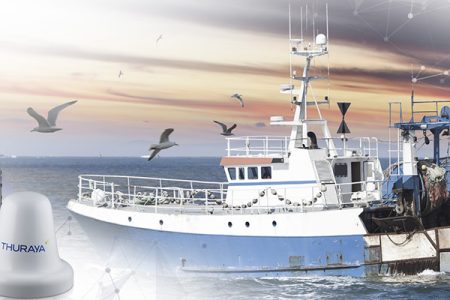 Satellite communications services provider IEC Telecom is touting its connectivity solutions for the fishing industry stating that it will serve an important role during the coronavirus pandemic. Connectivity at sea has never been more important than during these difficult times. While large vessels are equipped with multiple channels of communication, including circuit-switch terminals and VoIP applications powered by VSAT, smaller vessels, like those used in fishing industry, are hardly reachable.
Satellite communications services provider IEC Telecom is touting its connectivity solutions for the fishing industry stating that it will serve an important role during the coronavirus pandemic. Connectivity at sea has never been more important than during these difficult times. While large vessels are equipped with multiple channels of communication, including circuit-switch terminals and VoIP applications powered by VSAT, smaller vessels, like those used in fishing industry, are hardly reachable.
Jointly launched by Thuraya and IEC Telecom last year, MarineStar is an easy-to-install terminal with a built-in handset and small antenna, that operates using Thuraya’s extensive satellite network, providing dependable voice communications. Smart applications, such as push-weather notifications and fish catch reporting which are available through MarineStar, can offer enormous upsides for fishing businesses leading to greater efficiency and cost savings. With accurate meteorological updates and timely instructions received from shore, the crew would use time at sea more efficiently leading to fewer labour hours and decreased fuel consumption.
Even on vessels with electronic monitoring systems, accurate catch information and data collected on board is usually only shared months after a voyage is completed. Thuraya MarineStar’s catch reporting, tracking and monitoring capabilities are able to transfer data immediately – thereby helping maintain regulatory compliance and aiding sustainability goals.
Cost is an important factor for the fishing sector. IEC Telecom is able to provide Thuraya MarineStar for less than $1,000 and with no long-term commitment, flexible tariff plans and no early termination fees. In addition, in recognition of the vital function seafarers are playing during this global pandemic, IEC Telecom is offering to provide the hardware free of charge if vessel operators sign up to its crew welfare programme.
Nabil Ben Soussia, CEO Middle East, Asia & Turkey of IEC Telecom Group, said: “In the past, crew communication has not been a high priority for many fishing vessels. Often the crew make use of one corporate satellite handset and switch sim cards in order to use it. This approach can be problematic – the phone can be lost, stolen, run out of charge, or be stored in areas with no signal, and therefore shore offices may not be able to call it. In light of fast-changing Covid-19 regulations, it is important for crews to remain reachable at all times – and with MarineStar you have a robust handset providing reliable always-on communication.”
Today the global fishing fleet is estimated to include some 4.6m vessels, the majority of which are small boats with crew daily away from their loved ones. Such boats have neither the budget nor room for a costly satellite set up, but this does not mean that the crew has no other option but to stay disconnected.
“This pandemic has taught us to care more and stay in touch. The shipping sector has increased bandwidth allowance for their welfare programs, and fishing is now able to use MarineStar as a cost-effective gateway for its crew communication. This fixed terminal can operate similar to a public phone with access provided over scratch cards that can be purchased in the port or from the captain,” explained Soussia.
Marine fisheries provide a livelihood for some 260m people and, like all other businesses, it is facing survival problems during the pandemic. The global ‘lockdown’ has significantly impacted the demand for marine products, pushing vessel owners to seek new ways to optimise their operations.
Soussia added: “In modern fishing, we see an increasing push towards sustainability, catch traceability, and other forms of compliance. At present, unlike in other vessel sectors, the fishing industry is largely not taking advantage of the latest technological advances which could enable the collecting and utilising of vital information on fishing activity and catch levels. Installing MarineStar means vessels are able to benefit from the advances in technology now and are positioned ready to comply with any such future regulation.”












Add Comment